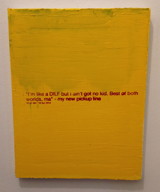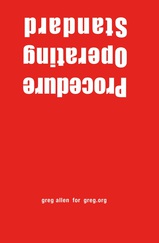A remarkably obtuse article in the NY Observer about an art world lawsuit in which the famous "'white' painter" "debunks" the prices and value of his (and, by extension, all contemporary) art. Who is the artist, you ask? Surely you've heard of "David Ryman?" You think so? Yeah, in fact, he's one of your favorite artists (or so you tell people at cocktail parties)? Well, read on. You're clearly the target audience.
Recap: Ryman was sued for one of two paintings by two London dealers who had paid another dealer for the work ($150,000 for two 8" x 8" "early" paintings in 1996) but never received it. Turns out the third dealer's check to Ryman for the second work bounced, and the dealer disappeared. The two were actually suing for the work itself, but the judge said they could only try and get their money back. (They were actually awarded $105,000, including interest.) Their lawyer was Richard Golub.
During the course of his questioning, Mr. Golub noted that one of Mr. Rymanís paintings was about to go on the block at a major auction house with a sales estimate of $2 million to $2.5 million. Mr. Ryman seemed to bristle at this.
"I donít have anything to do with the price," the artist said. "The prices are too high, I think, but Ióyou know."
"Did you ever complain to anybody to bring the prices down?" Mr. Golub asked.
"I wouldnít pay that for it myself," Mr. Ryman said.
"Did you ever refuse getting a check from a gallery before?" Mr. Golub continued. "Did you ever send a check back because you said they were paying you too much?"
"No," answered Mr. Ryman.
"I didnít think so," Mr. Golub replied.
Mr. Ryman had made one of the strangest admissions in recent memory. At any given time, some curmudgeon is always railing against the world of contemporary art, claiming that his kids could do a better job than the guys cutting cows in half and throwing white paint on blank canvasesóand here was Mr. Ryman admitting, under oath, that his paintings sold for too much money.
In the interest full disclosure, "At any given time" should be "just about every week in the
Observer," and "some curmudgeon" should be "
Hilton Kramer" or "
Mario Naves," the most reactionary Grumpy Old Men in the art critic world. It's frankly inexplicable that a paper as engaging (and seemingly smart) as the
Observer can be so willfully retrograde and ignorant about art and the art world.
1) Artists don't receive any of the proceeds from auction sales, and many "bristle" at the sales as well as the prices.
2) Dealers receive 30-50% of a work's sale price (more for primary market, less for secondary). For a cut like that, an artist should
expect the dealer to do the work of a transaction (market, cultivate, run interference, negotiate, collect, document, promote).
3) The mechanisms for setting the price of contemporary art may not be totally transparent or liquid (just the opposite), but they're not unknown or unknowable: dealers, curators, museums, collectors, auctions.
4) The artist's name is
Robert Ryman.












